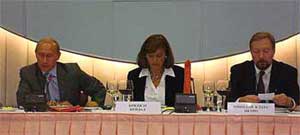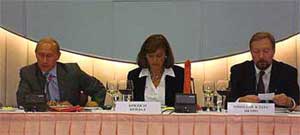 KINGSTON, R.I. – September 19, 2007 – University of Rhode Island Political Science Professor Nicolai Petro returned Monday from a week of meetings with Russia’s religious and political leaders, including President Vladimir Putin, which provided Petro with a unique opportunity to “take the pulse of the Russian elite.”
KINGSTON, R.I. – September 19, 2007 – University of Rhode Island Political Science Professor Nicolai Petro returned Monday from a week of meetings with Russia’s religious and political leaders, including President Vladimir Putin, which provided Petro with a unique opportunity to “take the pulse of the Russian elite.”
“I’m an admirer of Putin,” Petro said. “He has done what no other world leader alive today has accomplished — taken an economy that has been run into the ground and transformed it into one of the most dynamically growing economies in the world today.”
Putin has spread Russia’s increasing wealth around to all sectors of society, according to Petro, resulting in personal incomes growing at double-digit rates for seven straight years. Putin’s economic reforms have also provided increased funding for infrastructure and educational improvements and begun to shift the economy from its historic focus on natural resource use to high-tech development.
From a personal perspective, Putin made a favorable impression on Petro as well. “He’s a very energetic man, very dynamic,” noted Petro, who has served as a policy advisor to the U.S. State Department and to local governments in Russia. “I don’t know when he finds time to eat or sleep. He’s a whirlwind.”
Petro’s meeting with the Russian leaders was part of the annual Valdai Club discussion, which brings together a select group of foreign academics, policy analysts and journalists to share ideas with their Russian counterparts.
“The idea is for us to get to know them and for them to get to know us,” Petro said. “This kind of gathering is essential for state-to-state interaction and understanding.”
A scholar of Russian politics and culture, Petro has been awarded a Senior Fulbright Lectureship to Russia, an International Affairs Fellowship by the Council on Foreign Relations, and research awards by the National Council for Eurasian and East European Research, the Kennan Institute for Advanced Russian Studies, and the Hoover Institution at Stanford University.
Among the other political leaders the group met with were Mintimer Shaimiyev, the president of the Republic of Tatarstan; Vladimir Churov, chairman of the Central Election Committee; Sergei Ivanov, first deputy prime minister of Russia; and the leaders of several opposition political parties.
Petro was also pleased that the group had the opportunity to discuss the state of religious affairs in Russia and meet with Guzman Khazrat, the chairman of the Muslim Board; Anastassy, the Russian Orthodox Archbishop of Kazan and Tatarstan; and His Holiness the Patriarch of Russia, Alexy II.
After decades of forced atheism under Communist Party rule, religious activity in Russia has grown tremendously in recent years. More than 20,000 new churches have been built in the last 15 years, and the leaders of the major religions appear to get along well.
“Because of the state’s former suppression of religion, many Russians today are still ignorant of their own religious history,” explained Petro, “and you cannot fully comprehend your history without understanding its religious context.”
The country is currently in the midst of a debate over how and whether to incorporate religion into the school curriculum. The country’s Education Ministry has enacted a decree that mandates Russian regions teach one of two courses on religion: the foundations of Orthodox culture or a comparative history of world religions.
“This is all new to Russia, and different regions of the country are making different decisions based on the makeup of their communities,” Petro said. “One question they’re facing is how to deal with the country’s 20 million Muslims without offending them.”
In his remarks to the Valdai Club, Petro pointed out that as the European Union expands eastward, leaders must “be aware of the fundamental differences that still exist between Western Europe and Eastern Europe on religion. Western Europe is increasingly secularized and religious participation is declining, while in Eastern Europe religion is thriving. The further east the EU expands, the more Orthodox it will become, and the greater potential for misunderstanding and conflict.
“If integrating the Muslim community is the concern of the future, integrating the Orthodox community should be the concern – and the opportunity – of today,” he said.

